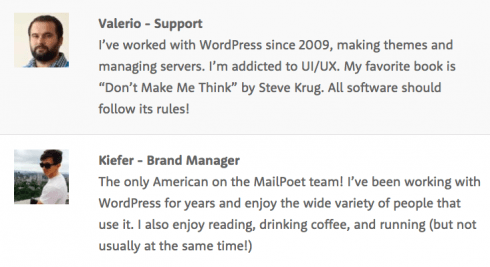At some point in time, you’ve probably read a blog post and thought, “I don’t really believe what the author is telling me.” In this post, we’re going to talk about why this happens and how you can avoid being that author.
The short answer? Authenticity (or lack of it). Too many bloggers write about topics they aren’t genuinely interested or invested in. By being authentic in your blog posts, you’ll avoid being labeled as a faker or swindler.
What is authenticity?
Authenticity, or being authentic, is simply the quality of being real and genuine. It means that the image you present online is pretty close to who you are in real life. If you run a blog about skiing, then you are pretty darn interested in skiing. If you run a newsletter for vegetarians, you are a vegetarian, and so on. When you pretend to be someone that you aren’t, you break the agreement of trust between you and your readers.
This is especially relevant when it comes to content like product reviews or recommendations. If you recommend products that you haven’t personally used, you are just asking for trouble, as your readers’ money is now involved.
It’s easy to be authentic when you truly understand your customers and their most pressing concerns. With that understanding, authenticity comes naturally. By combining genuine understanding with narrative skills, you can tell memorable and compelling stories that will be meaningful to your customers.
Forbes.com
Luckily, being authentic is pretty easy. All you need to do is understand your customers and make interesting, relevant content. When you are a master of your topic, authentic content will practically write itself.

Don’t lie or exaggerate
It may be tempting to over-exaggerate your subscriber count, your site’s page views, or the number of books you’ve sold. Don’t – it will backfire on you, I promise. Instead, be open and honest about your business. If you’re embarrassed by low numbers, then simply omit them. It’s better to not mention things than to lie about them.
However, if your stats are small, but not too small, it can actually be a benefit. When a blogger has millions of subscribers, we can’t really relate to them – it seems impossible that we’d ever get that many ourselves. As a result, they slide into unattainable “celebrity” territory for us.
When they have a smaller number of followers, however, bloggers can seem more relatable and their achievements more realistic. If you have a small but loyal audience, don’t be afraid to show them off.
Admit your mistakes
No one is perfect. Even the “professionals” don’t have a perfect track record. So don’t sweat it if you mess up – we’ve all been there.
When you make a mistake, like misspelling a word in an email subject line, forgetting to send out an email, or sending the wrong coupon code, the most important thing to remember is: don’t panic. It’s not the end of the world and the sun will still rise tomorrow.
What’s wrong with being perfect? It’s impossible. Therefore, if you try to be perfect or act perfectly, you are already being disingenuous. Embrace your imperfection and dare to be a bit vulnerable. You’ll be amazed where vulnerability can take you.
Psychology Today
Your course of action should depend on the severity of the mistake. Minor typo? You can probably ignore it. Massive mistake? You should probably address it as soon as possible.
The only wrong move is to ignore it completely. Do that, and people will get annoyed. Remember the last time you talked to a customer service representative at [large corporation]?
If you’re like most people, you probably had a bad experience, largely because you felt like they didn’t take your concerns seriously. When that happens, we feel like the company isn’t being authentic with us – they aren’t interacting with us on a human level. We’re just a number to them.

Be an expert (or become one)
Needless to say, you shouldn’t write about things that you don’t have knowledge of. This seems pretty obvious, but you’d be surprised at how often bloggers break this rule. If you aren’t an expert on a highly technical topic, don’t pretend to be an authority on it. Chances are you’ll get called out by an actual expert and be embarrassed in the process.
“An expert is a man who has made all the mistakes which can be made, in a narrow field.”
– Niels Bohr, Nobel Prize-winning physicist
If you want to write about a topic, but aren’t an expert yet, that’s okay. No one begins their career as an expert; they make hundreds of mistakes on the path to getting there. Just make sure that you do your research first (and double-check that your information is correct).
Have a face (and a story)
Finally, let’s get a little personal. One of the biggest mistakes bloggers make is being anonymous, whether directly (by not having any information about the author) or indirectly (by having vague or incomplete information).
Here at MailPoet, we like to be transparent about our team and about the work we’re doing. On our Team page, you can read brief biographies of each team member, as well as see what we look like.

While the biographies aren’t long (and the pictures are a tad outdated), they nonetheless help you get a feel for who we are as people. We also recently launched a new monthly “Release Notes” series in which we talk about what the team has been working on.
At the end of the day, people love a good story. To feed their need, try blogging about the progress and history of your business, the problems you’ve faced, and how you’ve overcome them. Your readers will appreciate your authenticity.




Speaking of not exaggerating, I usually tell folks that start their newsletters to aim for 100 subscribers. That’s already a great milestone to achieve. For comparison, nearly 75% of our users have less than 500 subscribers.
Hi Kim,
Thanks for the comment! We always appreciate reader feedback. Indeed, when you read blog posts by famous email marketers, the numbers are always discouraging. It’s important to remember that getting a few hundred subscribers is a big achievement for the average small business owner or blogger.